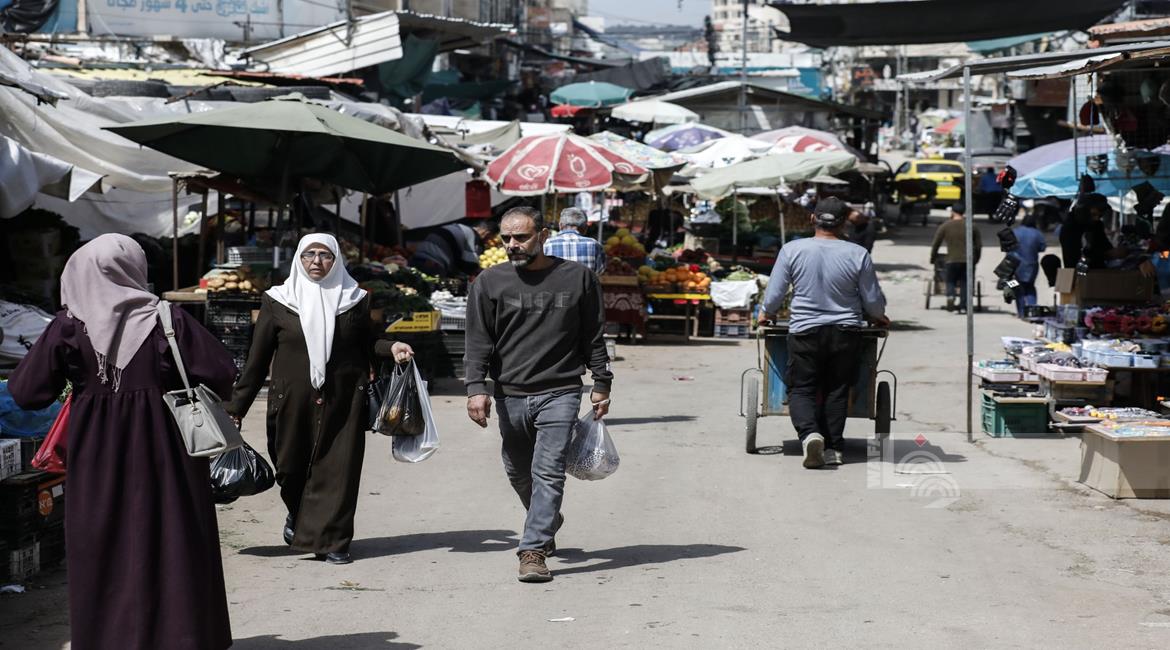RAMALLAH, Tuesday, April 20, 2021 (WAFA) - More than two-thirds of the West Bank and Gaza business establishments were closed for about one and half month during the first lockdown period between March 5 and May 31, 2020, where closure centered in the services sector in Bethlehem Governorate and a result 62% of establishments suffered from a decrease in supplies related to production inputs such as raw materials and production requirements.
In addition, there was a decline of about half in the production level or the size of sales, where 14% of Palestinian establishments had to let part of their employees go, in order to face this crisis.
This was the result of the first round of the COVID-19 Business Pulse Survey in Palestine, 2020, conducted by the Palestinian Central Bureau of Statistics (PCBS) in cooperation with GIZ.
Results indicated that 75% of establishments (93% in the West Bank and 37% in Gaza Strip) were closed for many days due to the restriction measures taken by the government as a preventative measure for fighting the Coronavirus outbreak.
The percentage of the closure days during the lockdown period was 50% concentrated in services activity, where the percentage of closure days for this activity reached 64% and it reached 55% for the industry activity, while the percentage of closure days for the activities of transport and trade reached 53% and 42%, respectively. In addition, the biggest percentage of closure was centered in Bethlehem Governorate for a period of more than two months.
Most of the establishments reported that sales/production size has decreased during the three months of the lockdown by 94%, with a decline in the average sales/production by 53% compared with normal situation, where establishments operating in construction sector recorded the highest decline of the average sales/production by 63%, followed by establishments operating in the transportation sector with a decline of 60%.
Results showed that 62% of the establishments reported having difficulties in the supply of inputs, raw materials or finished goods and purchased materials (68% in the West Bank and 51% in Gaza Strip). Hence, economic activities suffering the most from this difficulty were industry sector with a percentage of 69%, trade sector at 68% and construction sector at 68%.
Financial shock showed that 89% of the establishments faced a decline in the availability of cash flow, which affected the percentage of returned checks that increased to reach 37% (49% in the West Bank and 11% in Gaza Strip). Also, 59% of the establishments reported having a difficulty in the provision of financial services that are usually available in the normal situation.
In the financial adjustment mechanism, 39% of establishments had to have delay payments to suppliers and employees, whereas 36% of them had to get loans from friends, family, relatives to cover the shortage in cash flow.
As a response to the COVID-19 pandemic, 14% of the establishments had to dismiss and let go their employees to face the financial crisis resulted from the Coronavirus pandemic, whereas 8% of the establishments reduced the salaries and wages of their employees, and 11% of them gave their employees unpaid leave while 9% of them gave their employees a paid leave.
In the use of digital solutions, the survey found out that 13% of the establishments started using or have increased the use of internet, online social media networks, specialized apps or digital platforms in response to COVID-19 outbreak; whereas the main use of such digital solutions was for marketing with a percentage of 69%, 53% for business administration and 40% for service delivery.
According to the results of the survey, there is a direction by the government to turn into digital economy, where the Ministry of National Economy (MoNE) managed to make its services available online to ensure the fulfillment of transactions, especially import and export operations. Moreover, there are relentless efforts made by MoNE to provide technical support for establishments for training them on the requirements of shifting to online services and qualified staff to face the emerging needs.
During the last three months (88 days starting from March 5th until May 31st, 2020), establishments reported that the percentage of employees who were working remotely from home was 6% of the total number of employees; mainly in the telecommunication sector (18% of the total number of employees) and construction sector (8% of the total number of employees). The main results also showed that the highest percentage of employees who were working remotely from home was among large establishments with a percentage of 12%.
At least 69% of the establishments chose utility subsidies such as electricity, water, wastewater, internet services, and others, as the most needed policies to support their businesses over the COVID-19 crisis. While 55% of the establishments chose exemptions or tax deductions, followed by salary subsidies with 51% and 49% for rental deferral.
The expected percentage change in production for the next three months that establishments anticipated to be was a decline by 47% compared to the same period last year. As for the number of employees, they expected that it would decline by 23%.
M.K.












